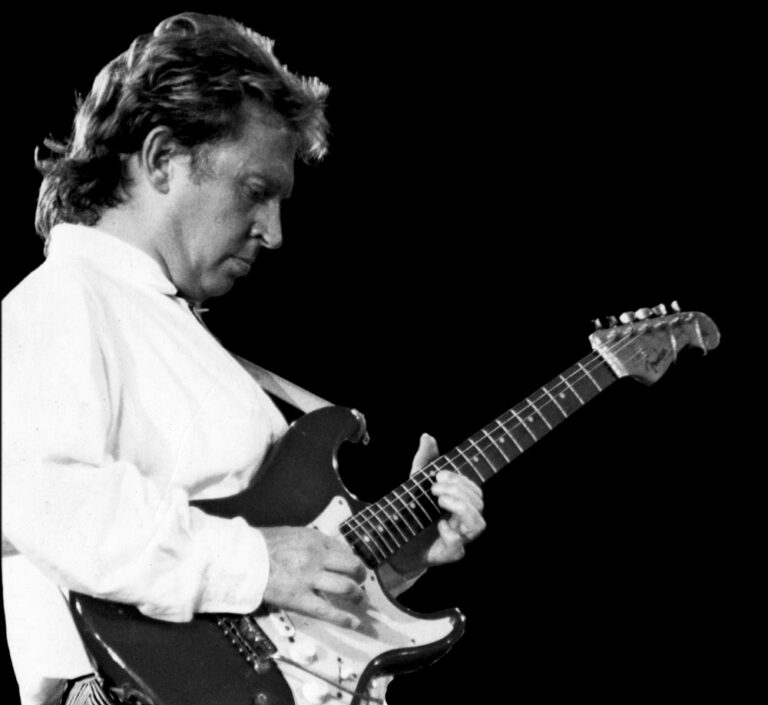The tenth installment of the biennial Ellnora: The Guitar Festival is underway this weekend at the University of Illinois’ Krannert Center for the Performing Arts in Urbana.
This year, the festival features feminist rock icon Ani DiFranco; Grammy-winning singer-songwriter Emmylou Harris; and Rock and Roll Hall of Fame inductee Andy Summers, formerly the guitarist of The Police.
IPM reporter Owen Henderson spoke with Summers about his work and upcoming show, “The Cracked Lens and A Missing String,” which takes place on Sept. 9 at 8:00 p.m.
OWEN HENDERSON: You rose to international fame for your work in the band, The Police. But you’re also a photographer and an author. How do you weave those different media together for your show?
ANDY SUMMERS: This is a audio visual show; multimedia, you might call it. Because we play to a large cinema screen. I have various photographic sequences that I play to. I improvise within the sound to the different photography sequences. Like a piece like “The Bones of Chuang Tzu,” which is one piece I play, I came up with a sound that I think gives it, you know, as the sort of exotic, sonic equivalent of what the photography is.
So there are these different things that people engage with the music, and they’re getting the images at the same time. And then on the writing level, I tell stories. I come out and go ‘Well, I went to South America, and now I got this whole story about getting arrested and being thrown in prison blah blah blah blah.’
Stories, you know, they’re pretty wacky stories, that I have actually been through all these things. And I’m not reading it from a book. It works better, I think, because I’m in the moment, and I’m sort of improvising these stories.
HENDERSON: How did you first realize you had a passion for photography?
SUMMERS: Well, you know, I mean, we’d go back a long ways when I was 15, 16, 17. You know, I used to go to the continental cinema, my hometown, and I watched so many arthouse films of that period. And I think it was a very big influence on me, that’s where the seeds are sown.
Although, of course, at the same time, I was an absolutely obsessive guitarist and musician. And that’s really where I wanted to go. You know, then you fast forward to this early period in The Police, 1979. I was in New York, and absolutely surrounded by photographers, and that spurred me on to go out and get a camera.
So I made a formal decision to be good at photography, like, ‘I’m gonna get really good at this, I’m going to study it.’ And I went all the years in The Police, you know, photographed like mad.
You know, The Police eventually packed it in. Well, I just kept going on with everything. Music and photography, just the same.
HENDERSON: Before your time in The Police where you were playing rock, you played R&B and psychedelic rock, and you’ve studied classical guitar. How do you think this variety of influences has shaped your current musical sensibilities?
SUMMERS: Yeah, well, that’s a good question. I mean, you know, I’ve been through a lot of things, sometimes out of necessity, just to survive. You know, the guitar has always been in my hands. And you know, there was a period when I lived in California, went to college.
And I did play classical guitar for a long time. I played in London, and I’ve, you know, been in bands and all that, playing electric guitar of course. And then I sort of felt I’d done that, and I went on to playing classical guitar and classical music for a long time, and then eventually returned back to the electric guitar.
I sort of picked up from where I left off, but all these things shape you and at the same time, you think about music all the time and trying to find your own way with it, you know, what you’re going to be.
I mean, obviously, technically, I was pretty skilled. But then above and beyond that, at least in my case, you go to the point, well, ‘Do I have anything original to say with a guitar or in terms of writing music composition?’ and you go into sort of a different atmosphere, and that’s, you know, where I’ve been. I’ve made 15 solo records all composed by me, so you create your own identity through music.

